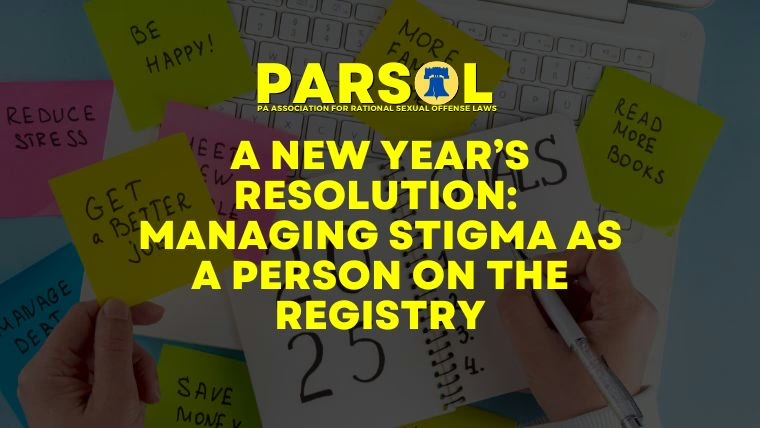It’s a new year! Many of us make New Year’s resolutions like a healthy diet, going to the gym, catching up with friends and family members, and financial goals to improve our lifestyles. Those are great resolutions, but what about persons forced to register (PFRs)? What’s something deeply personal for you to work on? Living with the label of “registered sex offender” presents profound challenges, but stigma does not have to define your life. Understanding and employing strategies to resist stigmatization can empower individuals to maintain their dignity and chart a positive path forward. Drawing on research, including insights from Emily Spivey’s 2023 study, “That Doesn’t Define Who I Am”: Strategies of Resistance to Stigmatization Among a Sample of U.S. Individuals Convicted of a Sexual Offense, here are actionable strategies for managing stigma and fostering resilience.
1. Recognize That Labels Do Not Define You
The stigma associated with a conviction can feel overwhelming, but it is crucial to separate your identity from your past actions. Many individuals on the registry reject the notion that the label “sex offender” encapsulates who they are. As one interviewee in Spivey’s study stated, “That does not define who I am. I am a father, a student, and a caring person.” By affirming your multifaceted identity, you can resist internalizing harmful stereotypes.
Developing a strong sense of self is foundational. Reflect on your values, skills, and aspirations. Engage in activities that reinforce your identity outside of the label, such as pursuing hobbies, joining community initiatives, or mentoring others. By focusing on these affirmations, you can build a narrative emphasizing your humanity and potential.
2. Reframe the Narrative
Reframing involves redefining the meaning of the label to reduce its negative impact. For example, you might view the label as reflecting a specific legal situation rather than a comprehensive judgment of your character. One Spivey study participant described this approach: “It’s just a legal category, not a reflection of who I am as a person.” By focusing on this perspective, you can challenge societal perceptions and maintain self-respect.
Additionally, reframing can include acknowledging your past while highlighting your growth. Statements like, “I made mistakes, but I’ve worked hard to learn and grow from them,” help to shift focus toward your efforts to change and improve. This can be especially effective in personal conversations or community engagements.
3. Build a Supportive Network
Isolation exacerbates the effects of stigma, so fostering connections with supportive family members, friends, or peers is essential. Surround yourself with people who see beyond the label and recognize your value. Support groups for individuals on the registry can also provide a safe space to share experiences and strategies for coping with stigma.
Consider joining or creating local support networks or online forums where you can discuss shared challenges and victories. Here in PA, we have the Pennsylvania Fearless Group, which meets online every second Saturday of the month at 4 p.m. Eastern Time. Knowing you are not alone can significantly reduce feelings of isolation and provide a platform for collective advocacy.
4. Focus on Personal Growth
Resilience comes from focusing on what you can control. Develop skills, pursue education, or work on personal projects that bring you a sense of accomplishment and purpose. As one participant in Spivey’s study explained, “I’ve focused on becoming a better version of myself, and that’s something no one can take away from me.”
Setting achievable goals and tracking your progress can also build confidence. Whether it’s learning a new language, adopting a fitness routine, or mastering a craft, dedicating time to self-improvement helps reinforce your agency and worth
5. Confront Stereotypes
While some individuals may choose to avoid discussions about their status, others find empowerment in challenging misconceptions directly. Educating others about the diversity of cases and the realities of the registry can shift conversations from fear and judgment to understanding. For instance, sharing facts about low recidivism rates among those who complete treatment programs may help combat public misconceptions.
If you choose to confront stereotypes, do so thoughtfully. Prepare accurate information and share your personal story in contexts where it can make a difference, such as in community meetings, advocacy groups, or through written pieces that challenge misconceptions.
6. Practice Self-Compassion
Stigma can lead to self-doubt and guilt, but practicing self-compassion is vital. Recognize that everyone makes mistakes and that your past does not determine your future. By treating yourself with kindness, you can build the strength to face external negativity.
Engage in practices that promote mental health, such as mindfulness, journaling, or therapy. Self-compassion is not about excusing past actions but about acknowledging your inherent worth as you strive to grow and improve.
7. Leverage Legal and Advocacy Resources
Knowing your rights and connecting with advocacy organizations can be instrumental in navigating challenges like housing, employment, and public disclosure. Advocacy groups often provide resources and legal assistance tailored to the needs of individuals on the registry.
Stay informed about local and national policies affecting individuals on the registry. Advocacy organizations can help you understand changes in legislation and may also connect you with opportunities to participate in efforts for reform, amplifying your voice and the voices of others.
8. Embrace Small Victories
Reclaiming your life may feel daunting, but celebrating small milestones can build momentum. Whether it’s finding stable housing, securing a job, or reconnecting with loved ones, each step forward is a testament to your resilience. Acknowledging these achievements can help sustain your motivation and provide a sense of accomplishment.
9. Volunteer with PARSOL
Working to change the laws and public policy around seuxal offenses in Pennsylvania is a heavy lift, but with the help of many volunteers PARSOL continues to make progress. There are undoubtedly others in your area of the state with whom you can connect for support and activism. PARSOL’s volunteers make a difference every day. Sign up at https://parsol.org/volunteer.
It’s a new year, and with it comes an opportunity for meaningful change. Managing stigma as a person on the registry is a complex journey, but it is not insurmountable. By rejecting harmful stereotypes, focusing on growth, and seeking support, you can resist the negative effects of stigmatization and reclaim your narrative. Spivey’s research emphasizes, “Resisting stigma protects one’s core self, enabling personal transformation and reintegration.” Remember, you are more than a label—you are a person with inherent worth and the power to shape your future. Let this year be a time of personal growth, resilience, and transformation.




![stuckIn1995_rally_header - PARSOL - Pennsylvania Assoc for Rational Sex Offense Laws (PA Megan's Law Resources) PARSOL Board Chair Josiah Krammes speaks at the PA Capitol Rotunda flanked by State Reps. Emily Kinkead and Tim Briggs (28 Oct 2025) [John Dawe/PARSOL]](https://parsol.org/wp-content/uploads/2025/10/stuckIn1995_rally_header.avif)